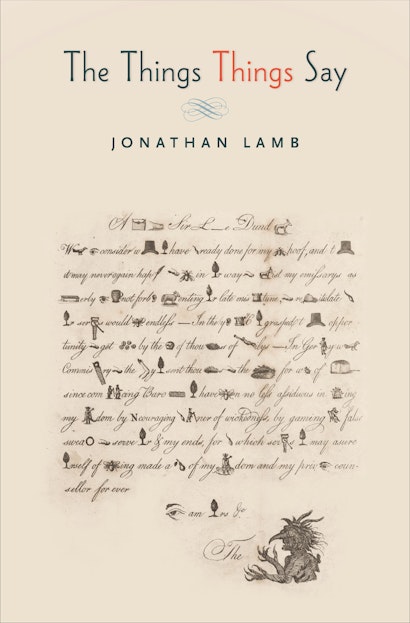One of the new forms of prose fiction that emerged in the eighteenth century was the first-person narrative told by things such as coins, coaches, clothes, animals, or insects. This is an ambitious new account of the context in which these “it narratives” became so popular. What does it mean when property declares independence of its owners and begins to move and speak? Jonathan Lamb addresses this and many other questions as he advances a new interpretation of these odd tales, from Defoe, Pope, Swift, Gay, and Sterne, to advertisements, still life paintings, and South Seas journals.
Lamb emphasizes the subversive and even nonsensical quality of what things say; their interests are so radically different from ours that we either destroy or worship them. Existing outside systems of exchange and the priorities of civil society, things in fact advertise the dissident obscurity common to slave narratives all the way from Aesop and Phaedrus to Frederick Douglass and Primo Levi, a way of meaning only what is said, never saying what is meant. This is what Defoe’s Roxana calls “the Sense of Things,” and it is found in sounds, substances, and images rather than conventional signs.
This major work illuminates not only “it narratives,” but also eighteenth-century literature, the rise of the novel, and the genealogy of the slave narrative.
Awards and Recognition
- Honorable Mention for the 2013 Barbara and George Perkins Prize, The International Society for the Study of Narrative
- Honorable Mention for the 2011 Oscar Kenshur Book Prize, The Center for Eighteenth-Century Studies at Indiana University
Jonathan Lamb is the Andrew W. Mellon Chair of the Humanities at Vanderbilt University. His books include The Evolution of Sympathy in the Long Eighteenth Century and Sterne's Fiction and the Double Principle.
"[A]stonishing."—Choice
"A truly magnificent book, passionately argued, [and] theoretically groundbreaking."—Lynn Festa, 1650-1850
"By listening to the things things say, Lamb succeeds in revealing just those aspects of the long eighteenth century we have been unable to apprehend because we have assumed literary culture's commitment to human interest stories. Lamb's vast knowledge of eighteenth-century literary history, philosophy of mind, political theory, and legal history is splendidly in evidence in this fascinating, panoramic study."—Deidre Shauna Lynch, University of Toronto
"Jonathan Lamb's fascinating study of the bizarre eighteenth-century genre known as 'it narratives'—in which a watch, coach, insect, dog, or body part tells its story—leads him to consider whether authors themselves have things in common with things. After reading this book you will never again think of ink as just ink."—Janet Todd, president of Lucy Cavendish College, University of Cambridge
"This is a real tour de force—a very learned and far-reaching book. It is far and away the best account of how eighteenth-century''it narratives' work and where they come from. But it is far more than that. Lamb is a very good close reader of texts, and his ability to join principles and ideas with individual traits and examples in texts is nothing short of dazzling."—J. Paul Hunter, University of Virginia
"Passionately argued and electrifying in its intellectual capaciousness and theoretical scope, The Things Things Say offers an illuminating account of the enmity and intimacy that bound person and thing together in the literature and culture of the eighteenth century. Tracing the shifting thresholds between human and nonhuman, between authorial agent and intractable thing, Lamb unveils the way civil, political, and literary fictions of the person sought to describe what might be proper to the self while confronting all that obdurately cannot be claimed for one's own. This is a groundbreaking work of scholarship, an exhilarating and enchanting argument that is as provocative in the questions it raises as it is persuasive in the answers it tenders."—Lynn Festa, Rutgers University


